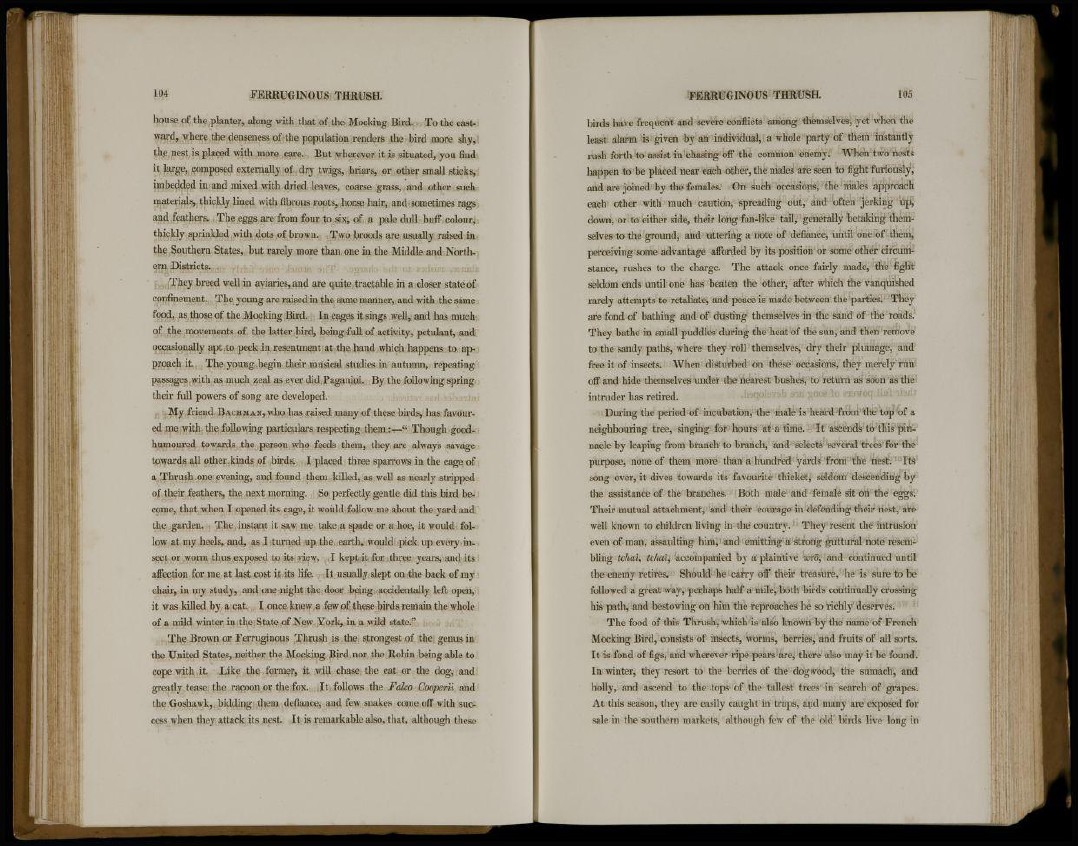
house of the planter, along with that of the Mocking Bird. To the eastward,
where the denseness of-the population renders the bird more shy,
the nest is placed with more care. But wherever it is situated, you find
it large, composed externally of dry twigs, briars, or other small sticks,
imbedded in and mixed with dried leaves, coarse grass, and other such
materials, thickly lined with fibrous roots, horse hair, and sometimes rags
and feathers. The eggs are from four to six, of a pale dull buff colour,
thickly sprinkled with dots of brown. Two broods are usually raised in
the Southern States, but rarely more than one in the Middle and Northern
Districts. .
They breed well in aviaries, and are quite, tractable in a closer state of
confinement. The young are raised in the same manner, and with the same
food, as those of the Mocking Bird. In cages it sings well, and has much
of the movements of the latter bird, being'full of activity, petulant, and
occasionally apt to peck in resentment at the hand which happens to approach
it. The young.begin their musical studies in autumn, repeating
passages.with as much zeal as ever did.Paganini. By the following spring
their full powers of song are developed.
My friend BACHMAN, who has raised many of these birds, has favoured
me with the following particulars respecting them_:-r-" Though goodhumoured
towards the person who feeds them, they are always savage
towards all other kinds of birds. I placed three sparrows in the cage of
a Thrush one evening, and found them killed, as well as nearly stripped
of their feathers, the next morning. So perfectly gentle did this bird become,
that when I opened its cage, it would follow me about the yard and
the garden. The instant it saw me take a spade or a.hoe, it would follow
at my heels, and, as I turned up the earth, would pick up every insect
or worm thus exposed to its view. I kept i t for three years, and its
affection for me at last cost it its life. It. usually slept on the back of my
chair, in my study, and one night the door being accidentally left open,
it was killed by a cat. I once knew a few of these birds remain the whole
of a mild winter in the State of New York, in a wild state."
The Brown or Ferruginous Thrush is the strongest of the genus in
the United States, neither the Mocking Bird nor the Robin being able to
cope with it. Like the former, it will chase the cat or the dog, and
greatly tease the racoon or the fox. It follows the Falco Cooperii and
the Goshawk, bidding them defiance, and few snakes come off with success
when they attack its nest. It is remarkable also, that, although these
birds have frequent and severe conflicts among themselves, yet when the
least alarm is given by an individual, a whole party of them instantly
rush forth to assist in chasing off the common enemy. When two nests
happen to be placed near each other, the males are seen to fight furiously,
and are joined by the females. On such occasions, the males approach
each other with much caution, spreading out, and often jerking up,
down, or to either side, their long fan-like tail, generally betaking themselves
to the ground, and uttering a note of defiance, until one of them,
perceiving some advantage afforded by its position or some other circumstance,
rushes to the charge. The attack once fairly made, the fight
seldom ends until one has beaten the other, after which the vanquished
rarely attempts to retaliate, and peace is made between the parties. They
are fond of bathing and of dusting themselves in the sand of the roads.
They bathe in small puddles during the heat of the sun, and then remove
to the sandy paths, where they roll themselves, dry their plumage, and
free it of insects. When disturbed on these occasions, they merely run
off and hide themselves under the nearest bushes, to return as soon as the
intruder has retired.
During the period of incubation, the male is heard from the top of a
neighbouring tree, singing for hours at a time. It ascends to this pinnacle
by leaping from branch to branch, and selects several trees for the
purpose, none of them more than a hundred yards from the nest. Its
song over, it dives towards its favourite thicket, seldom descending by
the assistance of the branches. Both male and female sit on the eggs.
Their mutual attachment, and their courage in defending their nest, are
well known to children living in the country. They resent the intrusion
even of man, assaulting him, and emitting a strong guttural note resembling
tchau tchai, accompanied by a plaintive roeo, and continued until
the enemy retires. Should he carry off their treasure, he is sure to be
followed a great way, perhaps half a mile, both birds continually crossing
his path, and bestowing on him the reproaches he so richly deserves.
The food of this Thrush, which is also known by the name of French
Mocking Bird, consists of insects, worms, berries, and fruits of all sorts.
It is fond of figs, and wherever ripe pears are, there also may it be found.
In winter, they resort to the berries of the dogwood, the sumach, and
holly, and ascend to the tops of the tallest trees in search of grapes.
At this season, they are easily caught in traps, and many are exposed for
sale in the southern markets, although few of the old birds live long in